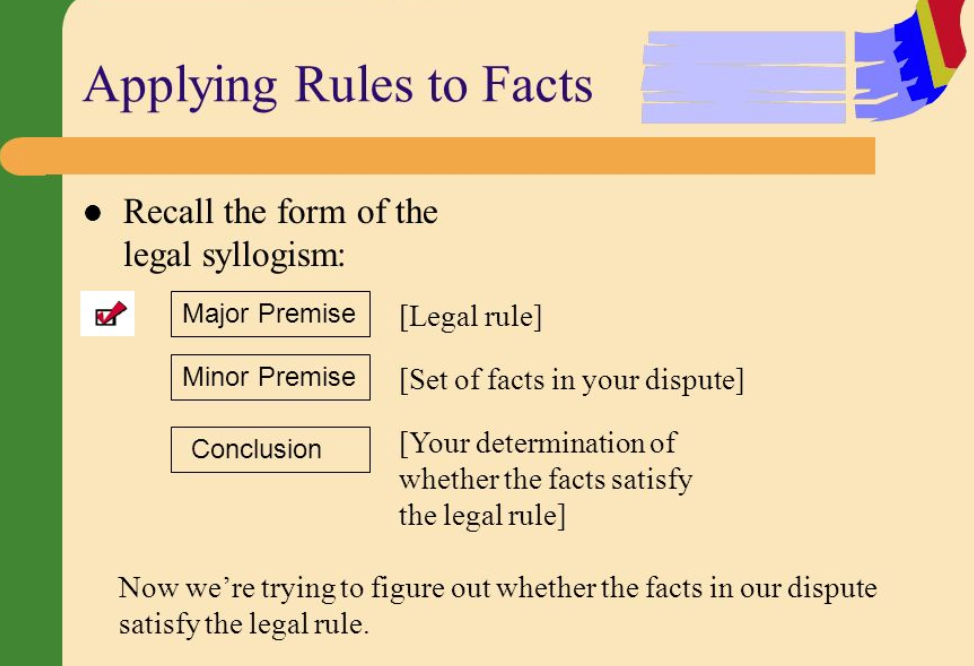Is Your Lawyer Any Good?
At the absolute minimum, your counsel should be able to concisely tell you what rules apply to your situation and, using these rules, tell you whether the situation you’ve described falls within it.

tl;dr Here are the criteria I use to evaluate my outside counsel:
- Is the advice actually good? (As in, is it clear, does it discuss the real-world risks, and does it describe how others have dealt with the same issue?)
- Are there other reasons to trust this lawyer? (As in, does she get back to you promptly, has she written on the subject before, and does she admit when she doesn’t know something?)
Is the Advice Actually Good?
Is the advice clearly communicated?
At the absolute minimum, your counsel should be able to concisely tell you what rules apply to your situation and, using these rules, tell you whether the situation you’ve described falls within it.
This advice structure is literally the first thing you learn in law school:

Is your counsel telling you what the actual risks are?
Because not all laws are equally enforced, knowing something could be illegal isn’t always helpful. When you’re deciding on what to do, what you really want to know is what is the likelihood and impact of something going sideways.
By the way, when your lawyer tells you that something is illegal, you can respond by noting that everything is illegal:
- 16 USC §742j-1(a)(3) make it a federal crime to knowingly participate in the use of an airplane to harass a fish.
- 7 USC §2149 & 9 CFR §2.132(c)(2)(ii) make it a federal crime for a cat dealer to get a cat without keeping a record of how they got the cat.
- 15 USC §2070 & 16 CFR §1207.5(e) make it a federal crime to sell a pool slide that isn't lubricated or otherwise able to provide the slider with a smooth, continuous slide. [It breaks my heart to imagine the unfortunate person that inspired this law].
Does your counsel tell you how other companies address the same issue?
This is what separates the great from the good. If they can tell you the rule, tell you the actual risks, and then tell you that they’ve advised tens or hundreds of companies about the same issue and here’s where they typically land, you’re in legal-advice-receiving heaven. I would volunteer for a below-the-knee amputation for advice like this. I’ll bring my own saw.
Are There Other Signs that This Lawyer Knows What She’s Talking About?
The unfortunate fact is that it’s rare to get superlative legal advice. So here are some additional factors:
Do they get back to you promptly?
Don’t make me ping you three times to get the answer to my question. Every time I ping you, I’m begging you to take the $1,500 per hour you’re charging me.
Why is being prompt correlated with quality? When evaluating founders, Sam Altman says that “[t]he best founders are unusually responsive. This is an indicator of decisiveness, focus, intensity, and the ability to get things done.” Ditto for attorneys.
Have they seen the issue before?
Just because they have doesn’t mean their answer is good, but it’s likely to be less wrong. Beware the lawyer who has never done something before, unless you’re not paying them very much, in which case you’re sorta getting what you paid for.
Have they written or spoken about the topic?
It’s rare to find outside counsel that has written a bunch on a topic buttttttt if they have, they have likely really thought about the issue from all angles and vetted their approach with their law firm colleagues. So, I trust the advice more.
Are they too confident?
Counterintuitively, my confidence in outside counsel is inversely proportional to their confidence. Legal issues are nuanced. It’s rare that any sufficiently complex question can be answered on the spot or doesn’t have tradeoffs. As a result, I have more confidence in attorneys who can outline the issue but take their time with an issue and appreciate the complexity.
Fin. That’s all I’ve got.